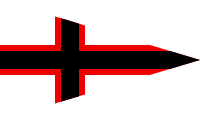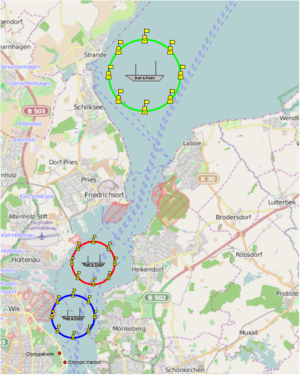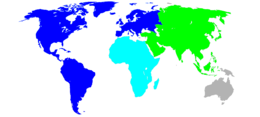Sailing at the 1936 Summer Olympics
| Sailing at the Games of the XI Olympiad | ||||||||||||||||
|---|---|---|---|---|---|---|---|---|---|---|---|---|---|---|---|---|
|
Plaque: Olympische Segel Wettbewerbe 1936 (Olympic Sailing Competition 1936) | ||||||||||||||||
| Venues | Firth of Kiel | |||||||||||||||
| Dates |
First race: 4 August 1936 Last race: 12 August 1936 | |||||||||||||||
| Sailors | 166 Male and 3 Female from 26 countries | |||||||||||||||
| Boats | 59 | |||||||||||||||
| Top ranked countries | ||||||||||||||||
| ||||||||||||||||
Sailing/Yachting is an Olympic sport starting from the Games of the 1st Olympiad (1896 Olympics in Athens, Greece). With the exception of 1904 and possible 1916 sailing was always a part of the Olympic program. The Sailing program of 1936 consisted of a total of four sailing classes (disciplines). For each class seven races were scheduled from 29 August 1936 to 8 September 1936 at the Firth of Kiel.
Venue
For the 1936 Berlin Summer Olympics a choice had to be made between the Berliner Müggel Lake district or the Kiel area. Finally the Organizing committee made the decision in favour of the big boats and picked Kiel.[1] As a result of the distance between Berlin to Kiel, a special committee for Yachting sprung to life to assist the Organizing Committee for the XIth Olympiad. Since Kiel was mainly a military port this Committee had to cooperate not only with the local authorities but also with the German Fleet Command in Kiel to ensure the success of the races.
| Olympic Harbor | |
|---|---|
|
 Burgee of the Kieler Yacht Club | |
| General information | |
| Status | Complete |
| Type | Olympic harbor |
| Country |
|
| Coordinates | 54°20′16″N 10°09′26″E / 54.33778°N 10.15722°ECoordinates: 54°20′16″N 10°09′26″E / 54.33778°N 10.15722°E |
| Elevation | Sealevel |
Course areas and courses
One race area was created to the East of Schilksee and two in the harbor area more into the Firth of Kiel. Near the course areas tribunes on barges and on land were placed for spectators.[2]


e.g: Start - 1 port - 7 port - 5 port - 1 port - 5 port - Finish.
The sailing was done on the triangular type Olympic courses. The start was made in the center of a set of 8 numbered marks that were places in a circle. This made it possible to begin and finish every race sailing against the wind, regardless of the direction of the wind. During the starting procedure the sequence of the marks was communicated to the sailors. Starting upwind ensure a fair start of every race.[2] This mark system is, at least in certain German lakes, still in use in many places.
The German Navy, was besides the organization of the race management responsible, with the help of the shipping lines, for keeping the race areas free of undesirable traffic.[2]
Olympic accommodation
| Olympiaheim | |
|---|---|
| General information | |
| Status | Complete |
| Type | Olympic athlete accommodation |
| Country |
|
| Coordinates | 54°20′16″N 10°09′26″E / 54.33778°N 10.15722°ECoordinates: 54°20′16″N 10°09′26″E / 54.33778°N 10.15722°E |
| Elevation | Sealevel |
Competition
Overview
| Continents | Countries | Classes | Boats | Male | Female |
|---|---|---|---|---|---|
| 4 | 26 | 4 | 59 | 166 | 3[1] |
Continents
 Map of Participating Sailing Continents at the 1936 Summer Olympics ● Green = Participating for the first time ● Blue = Participating ● Light Blue = Have previously participated |
|
Countries
 Map of Participating Sailing Countries at the 1936 Summer Olympics ● Green = Participating for the first time ● Blue = Participating ● Light Blue = Have previously participated |
|
Classes (equipment) [4]
|- ! Class !! Type !! Venue !! Event !! Sailors !! First OG !! Olympics so far |-|style="text-align:left"|O-Jolle | Dinghy | Kiel | Max. 1 Max. 1 substitute | 1936 | 1 | |||||||||||
| Star | Keelboat | Los Angeles | Max. 2 Max. 2 substitutes | 1932 | 2 | |||||||||||
| 6 Metre | Keelboat | Los Angeles | Max. 5 Max. 5 substitutes | 1908 | 7 | |||||||||||
| 8 Metre | Keelboat | Los Angeles | Max. 6 Max. 6 substitutes | 1908 | 7 | |||||||||||
| Legend: | ||||||||||||||||
| ||||||||||||||||
Race schedule
| ● | Opening ceremony | ● | Event competitions | ● | Final races | ● | Closing ceremony |
| Date | August | |||||||||
|---|---|---|---|---|---|---|---|---|---|---|
| 3rd Sat | 4th Sun | 5th Mon | 6th Tue | 7th Wed | 8th Thu | 9th Fri | 10th Sat | 11th Sun | 12th Mon | |
| Sailing (planning)[2] | ● ● ● ● |
● ● ● ● |
● ● ● ● |
● ● ● ● |
● ● ● ● |
● ● ● ● |
● ● ● ● |
Spare day | ||
| Total gold medals | 4 | |||||||||
| Ceremonies | ● | ● | ||||||||
Medal summary [4]
Sailing 1936
| Rank | Nation | Gold | Silver | Bronze | Total |
|---|---|---|---|---|---|
| 1 | | 1 | 1 | 1 | 3 |
| 2 | | 1 | 0 | 1 | 2 |
| | 1 | 0 | 1 | 2 | |
| 4 | | 1 | 0 | 0 | 1 |
| 5 | | 0 | 2 | 0 | 2 |
| 6 | | 0 | 1 | 1 | 2 |
| Total | 4 | 4 | 4 | 12 |
Sailing 1896–1936
| Rank | Nation | Gold | Silver | Bronze | Total |
|---|---|---|---|---|---|
| 1 | | 12 | 7 | 1 | 20 |
| 2 | | 11 | 4 | 3 | 18 |
| 3 | | 8 | 10 | 13 | 31 |
| 4 | | 5 | 5 | 4 | 14 |
| 5 | | 3 | 4 | 2 | 9 |
| 6 | | 2 | 2 | 1 | 5 |
| | 2 | 2 | 1 | 5 | |
| 8 | | 2 | 1 | 2 | 5 |
| 9 | | 2 | 0 | 0 | 2 |
| 10 | | 1 | 1 | 0 | 2 |
| 11 | | 1 | 0 | 0 | 1 |
| 12 | | 0 | 3 | 0 | 3 |
| 13 | | 0 | 1 | 4 | 5 |
| 14 | | 0 | 1 | 1 | 2 |
| 15 | | 0 | 0 | 1 | 1 |
| | 0 | 0 | 1 | 1 | |
| | 0 | 0 | 1 | 1 | |
| Total | 17 | 49 | 41 | 35 | 125 |
Ranking of the countries over the years

Notes
- A floating transmission station was used for reporting the race events to shore.[1]
- New media was also used in the protest room. On the footage made from a Zeppelin, for the film Olympia of Leni Riefenstahl, an incident was observed by the jury between Sweden and Finland in race No. VI of the 8 Metre. As result both teams were disqualified.[2]
Other information
Sailing
- This Summer Olympics established Sailing as a full mature Olympic sport after a long struggle to get a unified International standard set of rules.
- Each Olympic Gold medalist was also given a plant during the prize giving ceremony.
- Spain withdrew from sailing before the opening ceremony, as part of its boycott of the 1936 Summer Olympics.
- The Swiss 6 Metre was eliminated for all races since the helmsmen turned out not to be an amateur.
- Many protests in the Metre classes were filed. Speculations were made about whether this was due to the scoring system. One of the reasons was probably the close racing.
- The Olympic flame was burning on a Hanseatic galleon in the harbor of Kiel.[1]
- In total a number of 257 participants were entered. 169 of them competed, the others were reserves or team managers and so on.[1]
Sailors
During the Sailing regatta's at the 1936 Summer Olympics among others the following persons were competing in the various classes:
-
 Netherlands (NED), Daan Kagchelland in the O-Jolle is among the first sailors that did physical exercises on structural basis. Therefore, he was able to compensate his light body weight during heavy air races.
Netherlands (NED), Daan Kagchelland in the O-Jolle is among the first sailors that did physical exercises on structural basis. Therefore, he was able to compensate his light body weight during heavy air races. -
.svg.png) Germany (GER), Alfried Krupp von Bohlen und Halbach in the 8 Metre, played an important role for Germany in World War II.
Germany (GER), Alfried Krupp von Bohlen und Halbach in the 8 Metre, played an important role for Germany in World War II. -
 Great Britain (GBR), Peter Scott in the O-Jolle became later one of the presidents of the IYRU. He also was the one who advised to put the trapeze on the Flying Dutchman.
Great Britain (GBR), Peter Scott in the O-Jolle became later one of the presidents of the IYRU. He also was the one who advised to put the trapeze on the Flying Dutchman.
| Sailors at the 1936 Olympic Games | ||||||
|---|---|---|---|---|---|---|
|
Further reading
- "Digital Library Collection (Official Olympic Reports 1896 - 2008)". Digital Library Collection at la84.org. la84foundation. Retrieved 17 May 2015.
- "Berlin 1936". Olympic.org. International Olympic Committee.
References
- 1 2 3 4 5 (ed.) Richter, Dr. Friedrich (1936). The XITH Olympic Games Berlin, 1936: Officiel Report, Volume I (PDF). Berlin: the Organisationskomitee für die XI. Olympiade Berlin 1936 e.V. Retrieved 17 May 2015.
- 1 2 3 4 5 6 (ed.) Richter, Dr. Friedrich (1936). The XITH Olympic Games Berlin, 1936: Officiel Report, Volume II (PDF). Berlin: the Organisationskomitee für die XI. Olympiade Berlin 1936 e.V. Retrieved 17 May 2015.
- ↑ Hugh Drake & Paul Henderson (2009). Canada's Olympic Sailing Legacy, Paris 1924 – Beijing 2008. Toronto: CYA.
- 1 2 Kubatko, Justin. "Sailing at the 1936 Berlin Summer Games". Olympics at Sports-Reference.com. Sports Reference LLC. Retrieved 17 May 2015.
| ||||||








.jpg)
